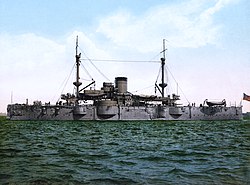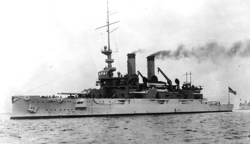Harvey armor was a type of steel naval armor developed in the early 1890s in which the front surfaces of the plates were case hardened. The method for...
5 KB (615 words) - 08:12, 10 February 2025
Ironclad warship (redirect from Armored corvette)
An ironclad was a steam-propelled warship protected by steel or iron armor constructed from 1859 to the early 1890s. The ironclad was developed as a result...
79 KB (10,763 words) - 22:28, 17 April 2025
Illinois-class battleship (section Armor)
battleships to feature dated technologies like fire-tube boilers and Harvey armor. They were armed with a main battery of four 13-inch (330 mm) guns in...
21 KB (2,517 words) - 15:15, 16 April 2025
Composite armour (redirect from Composite armor)
different metallurgical properties through their thickness (for example Harvey armor) was prohibitively expensive or too technically challenging. Teak was...
13 KB (1,522 words) - 05:30, 10 February 2025
Maine-class battleship (section Armor)
first American battleships to incorporate Krupp cemented armor, which was stronger than Harvey armor; smokeless powder, which allowed for higher-velocity...
20 KB (2,264 words) - 00:01, 25 April 2025
Naval armour (redirect from Ship armor)
increasingly complex arrangements with variable alloys. Case-hardened Harvey armor was the first major development, followed by chromium alloyed and specially...
43 KB (5,394 words) - 03:36, 2 August 2025
development, case-hardened steel armor—first Harvey armor and then crucially Krupp armor. The higher tensile strength of these armors compared to nickel steel...
65 KB (9,208 words) - 12:59, 4 July 2025
class, were armored with iron and steel compound armor. This was soon replaced with more effective case-hardened steel armor made using the Harvey process...
50 KB (6,528 words) - 15:17, 8 July 2025
"Harvey" or "Harvey Smith", term for the V sign Harvey armor, a type of naval armour Harvey F.C., a soccer team from Harvey, Illinois, USA Harvey mannequin...
4 KB (594 words) - 01:52, 19 May 2025
USS Texas (1892) (section Armor)
performance of the boat built for the Maine. The main waterline belt, made of Harvey armor, had a maximum thickness of 12 inches and tapered to 6 inches (152 mm)...
33 KB (4,291 words) - 17:14, 21 January 2025
Cementation process Crucible steel Harvey armor (also known as Harveyized steel), an early application of carburizing Hayward A. Harvey, a pioneer in the development...
10 KB (1,307 words) - 16:12, 19 August 2024
USS Iowa (BB-4) (section Armor)
would also be saved by the adoption of Harvey armor, which was significantly more effective than compound armor; a thinner belt could thus be used to achieve...
52 KB (7,301 words) - 21:49, 28 July 2025
the Kwantung Leased Territory. One of the first ships to use Harvey nickel-steel armor and Popov radios, she displaced 11,854 long tons (12,044 t) at...
23 KB (2,671 words) - 15:35, 23 October 2024
Mississippi-class battleship (section Armor)
that 5.75-inch (146 mm) of Krupp armor was equal to 7.75-inch (197 mm) of Harvey armor, 12-inch (300 mm) of compound armor, and 12-inch (300 mm) of wrought...
52 KB (6,834 words) - 21:57, 28 July 2025
Compound armor gave way to much stronger Harvey armor developed in the United States in 1890, which was in turn superseded by the German Krupp armor in 1894...
93 KB (12,676 words) - 11:43, 15 July 2025
velocity (and thus penetrating power), Krupp cemented armor that was stronger than Harvey armor used on earlier vessels, and water-tube boilers that provided...
17 KB (2,003 words) - 15:27, 22 April 2025
anchorage. Peresvet's waterline armor belt consisted of Harvey armor and was 4–9 inches (102–229 mm) thick. The Krupp cemented armor of her gun turrets had a...
23 KB (2,623 words) - 19:54, 20 October 2024
Arkansas-class monitor (section Armor)
$400 a ton for armor, a price that was too low to purchase Krupp Steel. In June the Navy would instead outfit the ships with Harvey armor instead, which...
18 KB (1,844 words) - 19:51, 23 June 2025
USS Olympia (C-6) (section Armor)
However, delays in the delivery of components, including the new Harvey steel armor, slowed completion. The last one-pounder gun was not delivered until...
48 KB (5,264 words) - 20:00, 9 July 2025
velocity (and thus penetrating power), Krupp cemented armor that was stronger than Harvey armor used on earlier vessels, and water-tube boilers that provided...
15 KB (1,703 words) - 16:00, 22 April 2025
USS Maine (1890) (category Armored cruisers of the United States Navy)
long-range vessels, with only limited armor protection, were needed. The advent of lightweight armor, such as Harvey steel, made this transformation possible...
104 KB (12,092 words) - 21:11, 20 July 2025
Charles Frémont Jr., in command. The total cost for the hull, machinery, armor and armament was $1,508,881.84. So that her name could be used for a new...
11 KB (974 words) - 11:54, 28 June 2025
New Orleans-class cruiser (1896) (section Armor)
and four .30-cal. (7.62 mm) Maxim machine guns. Harvey armor was used on these ships. The armored deck was 3+1⁄2 in (89 mm) on the sloped sides and...
12 KB (1,058 words) - 02:29, 10 July 2025
known for inventing the Harvey process for case hardening the front surface of steel armor plate. The resulting Harvey armor was widely used on armoured...
3 KB (211 words) - 05:37, 25 August 2024
California, on 8 December 1902. The total cost for the hull, machinery, armor and armament was $1,624,270.59. In 1909, the ship was renamed Cheyenne to...
17 KB (1,904 words) - 17:23, 23 June 2025
HDMS Skjold (1896) (section Armor)
development of nickel-steel alloys that led to Harvey armor. That year, the navy requested funding for a new armored coastal defense ship of around 3,500 long...
21 KB (2,606 words) - 23:33, 28 July 2025
Russian cruiser Rossia (section Armor)
(46 km/h; 29 mph). Rossia used newly developed Harvey armor which saved considerable weight over the steel armor used by Rurik for the same amount of protection...
27 KB (3,393 words) - 19:16, 17 June 2025
including a more effective armor layout (the result of using Harvey armor to reduce the thickness but not the effectiveness of armor) and a heavier secondary...
82 KB (8,595 words) - 12:12, 29 July 2025
had the same hull as Sissoi Veliky, protected with the newly developed Harvey armor. She was also the first Russian battleship to use electric power instead...
34 KB (4,284 words) - 23:13, 15 December 2024
velocity (and thus penetrating power), Krupp cemented armor that was stronger than Harvey armor used on earlier vessels, and water-tube boilers that provided...
17 KB (1,884 words) - 15:59, 22 April 2025




























